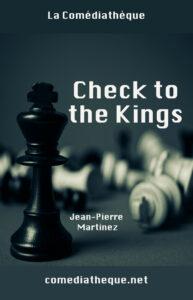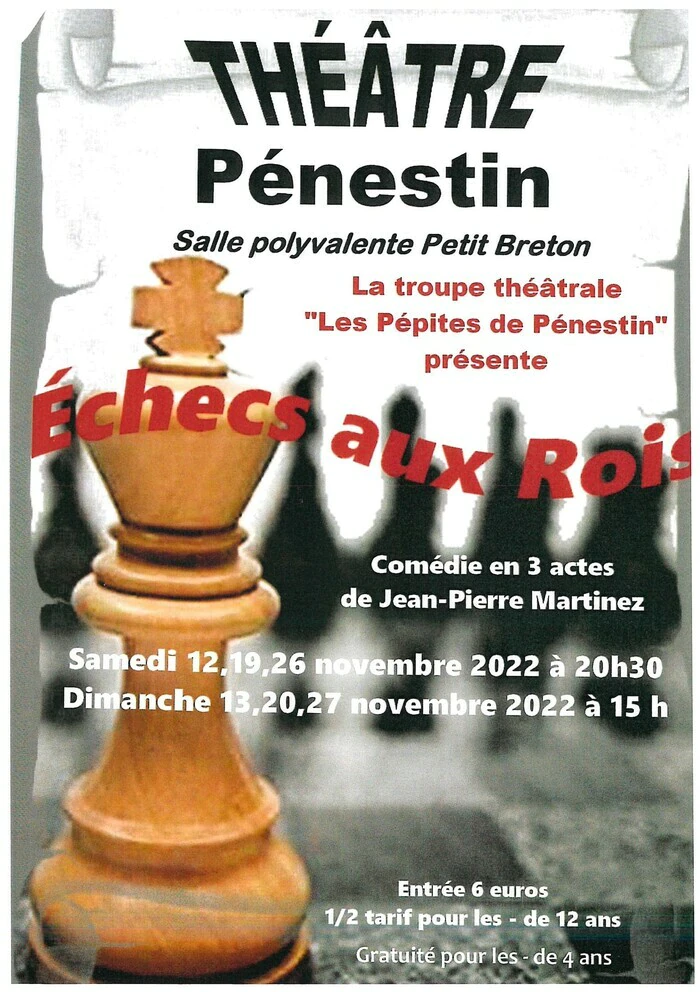Check to the Kings by Jean-Pierre Martinez

Politics often resembles a ruthless game of chess, devoid of moral considerations. Whether playing as the white or black pieces, the ultimate goal for each side is to conquer and eliminate the other, leaving only a solitary king on the board. This absurd game concludes with the opponent’s defeat, bringing the entire game to an end, only to set the stage for a potential rematch. Such is the theme explored in this dark comedy, where the king, queen, and their conniving contenders spare no pawns in their quest for victory. It serves as a tragicomic portrayal of the excesses that those infected with the political virus can indulge in…
Original title : Échecs aux Rois
Translation by the author
Cast: 8 characters
Possible casting: 6M/2F, 5M/3F, 4M/4F, 3M/5F, 6F/2M
A play written in July 2020
A play created at Saint-Régis-du-coin, the 29th of July 2021
Spanish translation by the author: Jaque Mate
Portuguese translation by the author: Xeque-Mate
Shows
France, Burkina Faso


Analysis
Check to the Kings is a satirical comedy that subverts the codes of power and monarchy to shed light on the excesses of authoritarian regimes. Through a plot interwoven with manipulation, corruption, betrayals, and opportunism, Jean-Pierre Martinez offers a critical reading of the mechanisms of power and how modern dictatorships manage to perpetuate their domination under the guise of democracy.
The game of chess serves as a metaphor for power, where each character plays a role in a political match where all moves are permitted.
1. A Critique of Contemporary Dictatorships
The play portrays an autocratic monarch who, over time, has transformed a presidential system into an absolute monarchy through successive constitutional amendments. This king, a former elected president, symbolizes regimes that exploit democratic processes to secure total control over a country.
The elements that highlight this decaying dictatorship include:
A rule based on repression and propaganda: the king has eliminated his opponents and silenced the independent press.
Institutionalized corruption: political and military elites participate in the plundering of the country’s wealth.
A society on the brink of collapse: the population suffers from economic crisis and hunger, leading to unrest.
The leader of the opposition, who embodies democratic hope, must navigate these realities while avoiding falling into the same pitfalls as those he opposes.
2. The Cynicism of Power and the Staging of Democracy
The play highlights how modern autocrats manipulate democratic institutions to maintain their grip on power:
Rigged elections and controlled candidates to prevent any real alternation in leadership.
The use of propaganda to shape public opinion and discredit opponents.
The exploitation of crises to consolidate their rule.
The most striking example in the play is the fabrication of a fake epidemic designed to:
Declare a state of emergency and justify postponing elections.
Plunge the population into fear, making them more submissive.
Allow the king to appear as a savior through a vaccine he controls.
This stratagem echoes the diversionary tactics and manipulation strategies employed by certain regimes to distract from real economic and social problems.
3. Chess as a Metaphor for Power
Throughout the play, chess is omnipresent, serving as a central metaphor to illustrate the strategic and political struggles between the various protagonists:
The King: accustomed to playing alone, he refuses to lose and manipulates the rules to his advantage.
The Minister: a cunning strategist who maneuvers behind the scenes to secure a place in the post-monarchic regime.
The General: a loyal servant of power, representing the military force that can shift allegiance.
The Princess: initially a spectator, she eventually becomes a decisive player.
The Leader of the Opposition: the king’s adversary, who must play cautiously to avoid being sacrificed.
The parallel between politics and chess is reinforced by dialogues in which characters use chess terminology to discuss power plays. Through this analogy, Martinez highlights the absurdity of political struggles, where individuals are mere interchangeable pieces.
4. The Ambiguity of Political Change
While Check to the Kings emphasizes the necessity of change, it does not endorse a naïve overthrow of power. The play warns against the illusions of political renewal:
The opposition leader, despite his ideals, must engage in compromises and power games.
The minister and the general, symbols of corruption, do not disappear but rather seek to reposition themselves within the new order.
The people, initially rebellious, become submissive under the weight of fear and manipulation, accepting an oppressive regime in exchange for an illusion of protection.
Thus, the play casts doubt on the possibility of real change, suggesting that while the actors of power may shift, the structures remain the same.
5. A Sharp Political Satire
Dark humor and cynicism permeate the play, making its political critique all the more impactful. Martinez employs:
Situational comedy, particularly with the king contemplating his own suicide but being persuaded by even more absurd alternatives.
Linguistic humor, with sharp retorts and wordplay (notably revolving around the “rope”).
Absurdity, reflecting the irrationality of power and the way dictators justify their most ludicrous decisions.
The play exposes the vanity and fragility of the powerful while highlighting the blindness of the masses in the face of political manipulation.
Conclusion
Check to the Kings is a biting political fable where power is a ruthless game whose rules change according to the interests of those in control. Jean-Pierre Martinez explores:
The manipulation of democratic institutions by authoritarian regimes.
The opportunism of elites willing to betray in order to stay in power.
The instrumentalization of fear as a tool for mass control.
The perpetual cycle of power, where each revolution sows the seeds of a new form of oppression.
By refusing to provide a definitive answer to the outcome of this chess match, the play prompts the audience to reflect: Can democracy truly prevail, or is it doomed to remain an illusion, manipulated by those who know how to exploit it?
